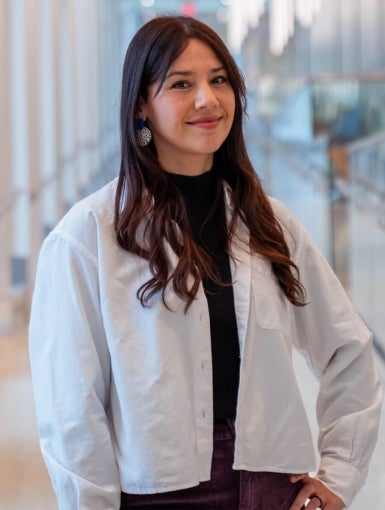
When Piera Celis was a child, her curiosity about technology began with a computer that barely worked. “Instead of giving up,” she recalled, “I took this sad device as a challenge and started learning how to fix it, how to install software (without a license, sorry about that), and how to do some basic coding.” That combination of persistence and wonder became the foundation for an academic journey that now explores how artificial intelligence, cyber governance and global security intersect. Today, as a PhD student in the School of Public Policy, Celis is examining the ethical, social and political dimensions of emerging technologies.
Through her research at the Center for Governance of Technology and Systems (GoTech) and the Center for International and Security Studies at Maryland (CISSM), Celis explores how digital technologies shape power and accountability in global affairs. Building on her background in sociology and her policy work in Latin America, her research bridges technical expertise with social science insight.
Technology has long served to project power and redirect history since arrows and knives.Piera Celis
“Technology has long served to project power and redirect history since arrows and knives,” said Celis. “Studying cyber governance and AI is the future; they are going to be essential developments in the years ahead because control of digital infrastructure will confer significant advantages in shaping international order.”
The evolution of AI and digital systems is more than about just technology for Celis. It is a question of global governance. She sees technology policy as fundamental to security because it determines who controls information, how authority is exercised online and what ethical limits should guide the use of power in the digital domain.
Celis studies how state-led actors use social media design to influence elections and polarization. She views these platforms as extensions of international relations, where the design of digital systems and their algorithms can shape geopolitical outcomes. “Technologies’ effects are far from neutral,” she explained. “They shape how societies think, act and trust.”
Inspired by their leadership, Celis credits the mentorship of Associate Research Professor Charles Harry and Research Professor Nancy Gallagher for helping her refine her research approach and expand her perspective on global security. She describes Harry as “a constant source of inspiration through his curiosity and enthusiasm in addressing complex issues.” Gallagher, she said, “has taught me how to think more broadly about security, emphasizing that collaboration can be a powerful path to achieving meaningful goals.”
Their combined influence has shaped her belief that progress comes not only from confrontation but also from cooperation and shared purpose, a principle that guides her research into global technology governance.
“UMD is becoming a very dynamic and stimulating place to conduct research like mine,” said Celis. “GoTech, along with other university initiatives, is doing impressive work and shows a genuine openness to exploring not only new methods but also new perspectives for understanding and shaping technology policy.”
She values the School’s collaborative, interdisciplinary culture, which she says fosters innovation and forward-looking research. As emerging technologies continue to reshape global power, Celis hopes her work will help policymakers build more transparent, accountable and cooperative systems of governance.




